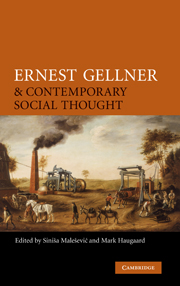Book contents
- Frontmatter
- Contents
- Notes on contributors
- Acknowledgements
- Introduction: an intellectual rebel with a cause
- Part I Civil society, coercion and liberty
- Part II Ideology, nationalism and modernity
- 5 Nationalism: restructuring Gellner's theory
- 6 Between the book and the new sword: Gellner, violence and ideology
- 7 Ernest Gellner and the multicultural mess
- Part III Islam, postmodernism and Gellner's metaphysic
- Index
- References
5 - Nationalism: restructuring Gellner's theory
Published online by Cambridge University Press: 22 September 2009
- Frontmatter
- Contents
- Notes on contributors
- Acknowledgements
- Introduction: an intellectual rebel with a cause
- Part I Civil society, coercion and liberty
- Part II Ideology, nationalism and modernity
- 5 Nationalism: restructuring Gellner's theory
- 6 Between the book and the new sword: Gellner, violence and ideology
- 7 Ernest Gellner and the multicultural mess
- Part III Islam, postmodernism and Gellner's metaphysic
- Index
- References
Summary
Introduction
The main thesis of this study is that, if one replaces Gellner's concept of industria with that of modernity, it is easier to identify mechanisms that non-teleologically link the structural conditions of modernity with the development of nationalism.
Modernity is here defined as the type of social organisation which became dominant in Western Europe after England's industrial revolution and the French Revolution. It entails the irreversible decline of the non-differentiated traditional community and the large-scale mobilisation and inclusion of the population into the centre. This unprecedented ‘bringing-in’ process portrays two unique structural features: (a) the deep, unmediated penetration by the state into the periphery, and (b)the top-down differentiation of a social formation's institutional spheres.
State penetration
At the end of the eighteenth and the beginning of the nineteenth century, owing to growing inter-state geopolitical struggles, as well as the rapid development of new communicative and organisational technologies, the ‘infrastructural' powers of the state assumed unprecedented dimensions. Expanding state bureaucracies managed to break the relative self-containment of traditional, local communities and to penetrate the periphery to a degree that had been unthinkable in premodern social formations, however despotic.
This penetration led to a massive transfer of material resources from the periphery to the centre, to the concentration at the top of the means not only of production but equally those of domination and violence.
- Type
- Chapter
- Information
- Ernest Gellner and Contemporary Social Thought , pp. 125 - 139Publisher: Cambridge University PressPrint publication year: 2007
References
- 1
- Cited by



